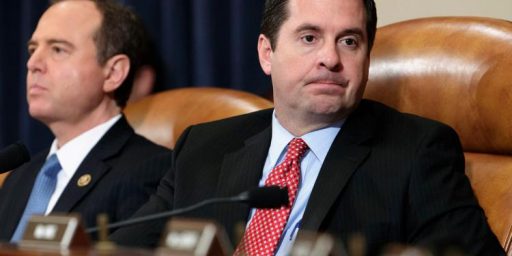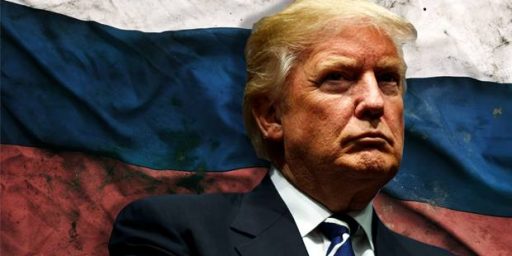The Need for Speed
John Hinderaker provides an excellent explanation for the most obvious rationale for not seeking a warrant before launching domestic surveillance against terror suspects:
[T]he issue of speed is critical. When we capture a cell phone or laptop being used by a terrorist, it is usually because we captured or killed the terrorist. The amount of time we have to exploit the capture is very short. The terrorists will soon figure out that their confederate is out of business, and stop using his cell phone numbers and email addresses. So if we are to benefit from the capture, we must begin obtaining information right now. A delay of even a few days may render the information useless, as the terrorists will have realized that their colleague has been neutralized. And it is likely that the first hours or even minutes after we obtain a cell phone number or email address are most apt to yield helpful new information. So it is easy to see why going through the process needed to obtain a warrant from the FISA court would undermine the effectiveness of our anti-terror operations.
This is entirely different from the situation we are all familiar with, where wiretaps are authorized against organized crime figures. Such wiretaps are not executed in connection with an arrest. They often continue for months or even years. There is ordinarily nothing about the context to suggest that the utility of the wiretap will expire in a matter of days, if not hours. Hence the delay required to obtain a warrant is usually immaterial.
Byron York goes further, reminding us that “Not long ago, both parties agreed the FISA court was a problem.”
In 2002, when the president made his decision, there was widespread, bipartisan frustration with the slowness and inefficiency of the bureaucracy involved in seeking warrants from the special intelligence court, known as the FISA court. Even later, after the provisions of the Patriot Act had had time to take effect, there were still problems with the FISA court — problems examined by members of the September 11 Commission — and questions about whether the court can deal effectively with the fastest-changing cases in the war on terror.
People familiar with the process say the problem is not so much with the court itself as with the process required to bring a case before the court. “It takes days, sometimes weeks, to get the application for FISA together,” says one source. “It’s not so much that the court doesn’t grant them quickly, it’s that it takes a long time to get to the court. Even after the Patriot Act, it’s still a very cumbersome process. It is not built for speed, it is not built to be efficient. It is built with an eye to keeping [investigators] in check.” And even though the attorney general has the authority in some cases to undertake surveillance immediately, and then seek an emergency warrant, that process is just as cumbersome as the normal way of doing things.
Lawmakers of both parties recognized the problem in the months after the September 11 terrorist attacks. They pointed to the case of Coleen Rowley, the FBI agent who ran up against a number roadblocks in her effort to secure a FISA warrant in the case of Zacarias Moussaoui, the al Qaeda operative who had taken flight training in preparation for the hijackings. Investigators wanted to study the contents of Moussaoui’s laptop computer, but the FBI bureaucracy involved in applying for a FISA warrant was stifling, and there were real questions about whether investigators could meet the FISA court’s probable-cause standard for granting a warrant. FBI agents became so frustrated that they considered flying Moussaoui to France, where his computer could be examined. But then the attacks came, and it was too late.
Rowley wrote up her concerns in a famous 13-page memo to FBI Director Robert Mueller, and then elaborated on them in testimony to Congress. “Rowley depicted the legal mechanism for security warrants under the Foreign Intelligence Surveillance Act, or FISA, as burdensome and restrictive, a virtual roadblock to effective law enforcement,” Legal Times reported in September 2002.
The Patriot Act included some provisions, supported by lawmakers of both parties, to make securing such warrants easier. But it did not fix the problem. In April 2004, when members of the September 11 Commission briefed the press on some of their preliminary findings, they reported that significant problems remained.
Now, of course, this doesn’t explain why the administration didn’t seek warrants after the fact, as they are entitled to do under FISA.






Because they weren’t relying on FISA. They claim, correctly imo, that authority derives from Article II of the Constitution and the Authorization for Use of Military Force; effectively this is a war power to collect military intelligence and not a warrantless search for the purpose of criminal indictment.
The Authorization for Use of Military Force is not, nor was it ever, a declaration of war, if the president really wanted war powers he should get a declaration from congress. This is exactly why the founders insisted on the congressional power to declare war.
I’m pretty sure that Republicans would not have bought this flimsy excuse if Clinton was caught doing the same thing during the conflicts in Kosovo or Bosnia. If you actually believe this line of reasoning then the constitution has taken more damage then an army of “activist†judges ever could hope to inflict. At this point, the 4th amendment has no meaning whatsoever other then what the executive branch says it does.
God help us all if Hillary gets elected with these broad sweeping powers.
Rick: I would argue that congressional “declaration” is a process that, for good or ill, is dead. We have fought several major wars in the six decades since the last declaration, with American military deaths exceeding 100,000. The distinction between “use of force” and “war” is one without meaning.
And no one is arguing that the president can bypass the 4th amendment whenever he feels like it. No evidence obtained from these “searches” would be admissible in court.
First what Bush did I hold unquestionably legal. But let’s imagine that to be complete, just so the Demorats wouldn’t complain… (yeah, fat friggin chance, right?)… how would it be now had Bush gone the extra step and thereby gotten bogged down in the FISA court? The Democrats would be screaming bloody murder that Bush didn’t do all he could, and we’d be cleaning up from post 9/11 attacks ion this country.
Of course what’s really going on here is that the Demorats are pissed that Bush did his job so well at keeping this country safe, they don’t have a political foothold.
We know that such wiretaps saved countless lives… in the Buffalo case, in the NY (Brooklyn bridge) case, and more.
So, are the Democrats saying they’d sacrifice civilian lives for this?
I think so.
Sen. Biden disagreed during the 2002 campaign — something about how the words “I declare war” contain no special constitutional magic.
I think it is relatively simple why the Bush administration did not bother to seek “FISA, may I” approval after the fact. Would you like to see a headline in the NY Times that says FISA Judge Declares Bush Wiretaps Illegal”?